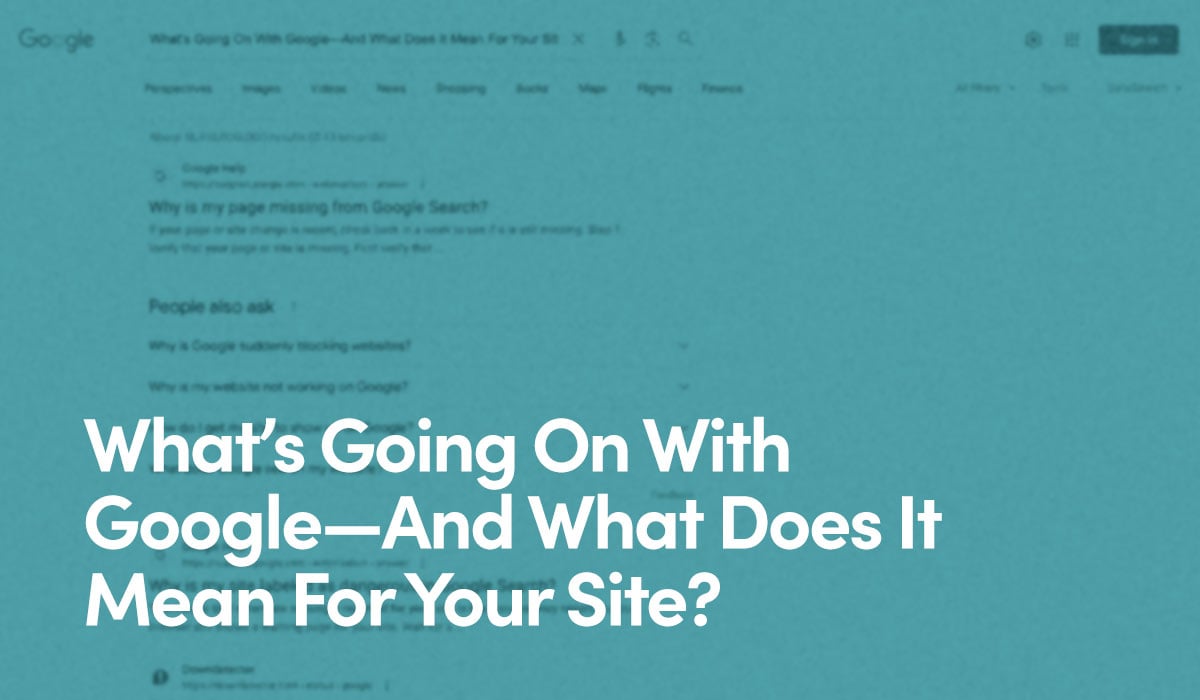Whatever else can be said for it, 2023 has not been a dull year for those of us who constantly think/worry about/obsess over search results and the art and science of getting your business discovered through search engine optimization (SEO).
We’ve covered some of the changes previously, including the rise of zero-click search, the threats and opportunities posed by AI-generated content, and even the prospect that tools like ChatGPT may come to replace search engines altogether.
Related: SEO & Content Marketing in the Age of AI: What You Need to Know
And yet, we haven’t covered anything close to all of the developments, with announcements of Google algorithm updates coming thick and fast recently.
There’s a good reason for that: While we pay attention to trends and changes in SEO, we’re not beholden to them. As content creators, we’ve never bought into the “one weird trick”-style tips and hacks that so many practitioners in the space spend their days chasing—because we’ve always believed that, at the heart of it, search engines (primarily Google) want to deliver the best user experience. This means that, while the latest tricks and hacks might work in the short term, the only key to sustained success in SEO is to produce quality content.
But even with that in mind, the past couple of quarters have seen a lot of wailing and gnashing of teeth from SEO specialists across the web—enough that it’s worth paying a little more attention to than usual.
How Often Does Google Update its Algorithm?
The reality is that Google makes tweaks to its algorithm all the time. A few times a year, it will make updates that are significant enough that it either warns SEO specialists in advance or, at the least, admits after the fact that these changes have taken place.
The most significant of these changes is reported on Google’s Search Status Dashboard, which covers five major types of updates:
- Core Updates
- Page Experience Updates
- Product Review Updates
- Helpful Content Updates
- Spam Updates
For a fuller explanation of what each of those updates focuses on, check out the following article: Google Algorithm Updates: What Do They Mean For Your Website?
For now, though, know that core updates tend to be the ones that cause SEO specialists to freak out the hardest: those typically signal the most significant changes to the algorithm’s basic work of deciding which sites get rewarded, and which get penalized.
According to Google’s dashboard, there have been four core updates in 2023 to date—and three since August, including one that remains ongoing at the time of writing.
By comparison, there were just two core updates for the whole of 2022, and three each in 2021 and 2020—with spacing in each of those years that was significantly more relaxed.
Put another way: SEO practioners aren’t imagining it—this year, and the past few months in particular, have been more volatile than anything we’ve seen for years.
Transform Your Marketing With Strategic Content
Ready to Convert More Leads Into Loyal Customers?
Discover Our Content Engineering Expertise arrow_forwardCan We Expect Any More Updates This Year?
Changes to the Google algorithm are like recessions: no one truly knows when they’re coming, but if you predict them often enough, you’ll eventually be right. With that said, there are some signs that Google might not be done tweaking its core algorithm for the year.
Notably, Google’s Search Liaison, Danny Sullivan, recently sent SEO specialists’ blood pressure spiking when he may have told a major search marketing conference that there were likely to be significant changes coming, and that they should “buckle up.”

Except…Sullivan says that’s not exactly what he said:
So where does all that leave us?
First off, it seems likely that there will be more updates this year, or in the first quarter of 2024 at the latest. And, just like with every other update, they will impact some sites positively, and others negatively, while the vast majority of users won’t notice any difference at all.
But it’s worth revisiting the penultimate sentence of Sullivan’s tweet: “those who are making good, people-first content should be fine.”
If that sentiment sounds familiar, it’s because it brings us full circle to the beginning of this piece. Google’s goal is to connect users with content that is most likely to meet their needs at that exact moment in time.
To do that, it is in a never-ending battle with “specialists” who have sought over the years to game its algorithm with tricks like keyword stuffing, buying backlinks, faking schema markup, spamming blog comment sections, and more—all of which degrade the overall user experience at the expense of sites that do things the right way.
And that’s the bottom line: The “right way” is hard. It takes time, patience, research, expertise, and a LOT of hard work. At Hypha, we know that because we live it, every single day—and we know which of our competitors do the same.
While we do sometimes see a client lose ground in the aftermath of one of these changes, we’ve never yet seen one that didn’t recover in a matter of weeks—and we’ve also seen clients whose sites take off as a result of these types of updates as well.
As for your site—if you’re a client, then we’re on it. If we see unusual fluctuations in keywords and/or traffic, the first thing we do is figure out why—and whether or not it matters for your business goals. The piece that tends to get lost in these conversations is that, for most businesses, having lots of traffic does not matter. Having relevant traffic is the key. That’s the game that Google is in—and that’s the only one we’re interested in playing.
In the weeks ahead, I’ll be writing a little more on this, including a case study on a recent success story that proves that this quality-led, long-term approach to building search presence still works, even amid all these changes. Until then, know that algorithm changes will continue to happen, SEO specialists will continue to greet each one as if the sky is falling, and sites that are built on strong foundations of quality content that is maintained regularly will continue to win in the long run.
Hypha Development is a New York-based HubSpot Partner Agency specializing in engineering Inbound Marketing & Strategic Content solutions to get you more customers, convert more leads, and help you achieve sustainable growth. Contact our team today!


%20overlayed%20on%20an%20image%20of%20a%20woman%20doing%20research%20on%20her%20computer%20and%20a%20man%20reading%20at%20the%20table%20beside%20her.jpg)
